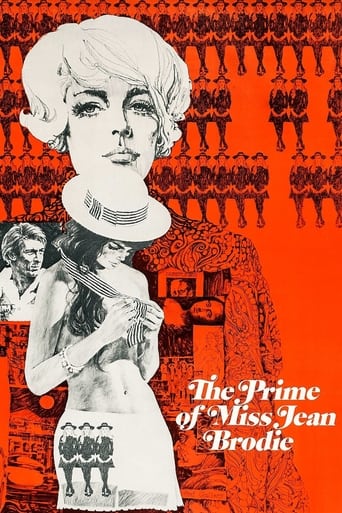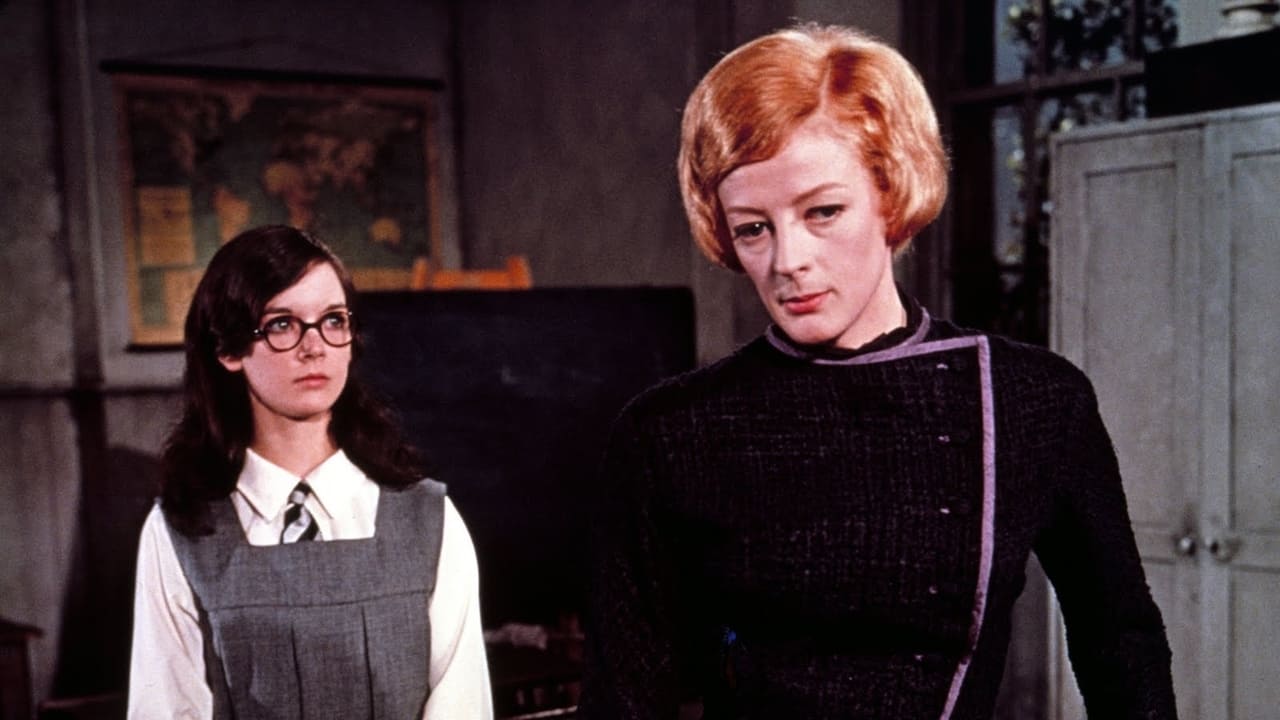leethomas-11621
Character study of egotistically romantic and ultimately dangerous teacher of young girls set in 1930s Scotland. But stage-bound and why is the school interior relentlessly grey? Worth watching for Maggie Smith.
SnoopyStyle
It's 1932 Edinburgh. Jean Brodie (Maggie Smith) is a single teacher in the Marcia Blaine School for Girls. She considers herself to be in her Prime teaching her precocious girls love, politics and art. She admires Mussolini as a "man of action" and raises funds for Franco. Two teachers take a fancy to her. Gordon Lowther is the nice music teacher. Teddy Lloyd is the edgy art teacher who asks to paint her. Brodie and Lloyd kiss. Stuttering Mary catches them. The other girls Monica, "dependable" smart Sandy and pretty Jenny force it out of her. After Lloyd paints Jenny, the girls leave his studio with Sandy staying behind. Lloyd makes a pass at her. Sandy starts to wonder about their unquestioned admiration for Brodie. A romantic letter written by two of the girls is found and the headmistress demands Brodie resign.This starts off like a nice coming-of-age movie. Sure there is the fascist support from Brodie but that could be an easy learning experience for everybody later on. It just keeps taking a darker and darker turn. It would be less jarring if it foreshadow the dark turns with some ominous scenes early on. It would also help to make Sandy the protagonist instead of Brodie. The darkness is compelling and Maggie Smith is amazing. This is an interesting take on the coming-of-age story.
Scott Amundsen
Penetrating character studies work well in novels and on the stage, where the action may be concentrated in one location. They are not as often found in films, except where the "hero" is bigger than life or surrounded by lots of action as in such films as BRAVEHEART and LAWRENCE OF ARABIA. Rarely does a film do what Ronald Neame's THE PRIME OF MISS JEAN BRODIE does: shine a spotlight on a character and the small milieu in which she operates.Movies about charismatic teachers aren't new either, but in most cases the teacher is the clear hero of the story, inspiring his/her students to accomplish things they never dreamed they could. What sets PRIME apart is that Jean Brodie is a mass of internal and external contradictions whose effect on her pupils tends to turn out somewhat differently than she intends.Jean Brodie is a dreamer, somewhat of a narcissist, and takes pride in the influence she has over "her girls," who are known throughout the school as "the Brodie set." They take tea and dinner at her flat, they spend weekends with her at the home of the singing master Mr Lowther (Gordon Jackson), with whom Miss Brodie is having an affair but who later marries another woman. This affair is of particular interest because the students discover that it isn't the singing master that Brodie is in love with but the art master (Smith's then-husband Robert Stephens), with whom she slept once but refuses to continue the affair because he is a married man.Jean Brodie is a fascinating woman, warts and all. She brazens her way through life despite having some very wrong-headed ideas: she idolizes Mussolini and Hitler, and her admiration for Franco inspires one rather dim-witted girl to decamp and head off to fight for Franco, where she believes her brother to be. He is, in fact, fighting on the other side, and the girl is killed in a train wreck before she even gets there, never knowing her mistake.At bottom, what makes Jean Brodie the most interesting is that she chooses to teach at a highly conventional school where her ideas are almost universally frowned upon by the headmistress and the rest of the faculty (with the exception of the two males whom she manipulates). It is this fact that ends up being her undoing, as one student finally sees through her and confronts her with the truth about herself in a scene that positively shoots fireworks off the screen.Maggie Smith is magnificent; this is one of the greatest performances by a leading actress ever committed to film. She is aided and abetted by an astounding cast of superb actors, all of whom fit their roles so perfectly that we forget we are watching actors.The children are especially good here. The kids are always the riskiest part of making a film about a school; the results can be somewhat uneven as in DEAD POETS SOCIETY. Here, the "children" hold their own against the adult actors remarkably well, with special kudos going to Pamela Franklin for her brilliantly penetrating study of the girl who finally sees Miss Brodie for what she is.At the end of the day, I found it hard to come to a conclusion about Jean Brodie. She is obviously wrong-headed and stubborn about certain things, but she also encourages independent and critical thinking in her pupils at a time when conformity was the order of the day. The fact that her real agenda is to create a group of Brodie clones ("the crème de la crème," as Miss Brodie would have it) is one of the great ironies of both her character and the film itself. The other great irony is that the very philosophy of critical thinking that she imparts to "her girls" is precisely the force that eventually drives Sandy (Franklin) to betray her to the headmistress and thus cost her her position. The film ends with Sandy walking placidly away from her final confrontation with Jean, who rushes out the door of her classroom and shouts "Assassin!" twice at the girl's retreating back.In the novel, Jean Brodie's defeat is total; forced into "early retirement," she dies some few years later. But the Brodie of the novel is a good fifteen to twenty years older than the Brodie of the film (at thirty-five, Smith was herself definitely in her own prime, which informs her characterization), and while her fate is left to the imagination of the audience, it is hard to believe that Jean's defeat is total and one suspects that with her strength of will she would eventually come out on top in the end. Possibly she might have to leave Edinburgh and seek a post elsewhere, but it seems certain that she would think of something.This is really a film for people who like to watch great actors ply their craft. Smith strikes all the right notes; she is to acting what Paderewski was to the piano. And the supporting cast is the orchestra that makes this concerto unforgettable.Note: This one rewards multiple viewings.
Gloede_The_Saint
I can't even put words on this movie. It's too much. If ever there was a film "before it's time" it's this. The level of depravity, insight and emotional power is different from anything else I have seen. It's almost unrateable, but a 10/10 should do.Maggie Smith(who deserved her Oscar!!!!!!!!!!) plays a teacher so obviously deranged but still so human. In fact all the main characters in this film are humans in their purest form: FLAWED, but not directly evil. The characters, no matter how devious do believe to be in the right, and they often are.From the revolutionary fascist snob who considers herself the best example of humanity and has the depravity to try to form the girls in her own image and after her own sickly plans also teaches them individualism and to fight for what they believe. The black hearted, spiteful and utterly conservative Christian principle Miss MacKay(Celia Johnson) do at heart have more or less good intentions, at least in regard to the children. Oh and to make it clear the film is not about the struggle between these characters but rather about life.Beyond any doubt Ronald Neames greatest effort, and this is the director who made The Man Who Never Was. It doesn't even compare in greatness, nor impact. This is just extraordinary. It's a unique power to manage to make such a portrait were nobody are really in the right and despite huge flaws such as fascism, prejudice, adultery, weakness, spitefulness and to some extent even pedophilia they are still likable. This is not only a powerhouse of performances. I need to point out how amazing Pamela Franklin was as well!!!! But also a powerhouse of emotions and uncertainty. In essence, truly human.


 AD
AD




